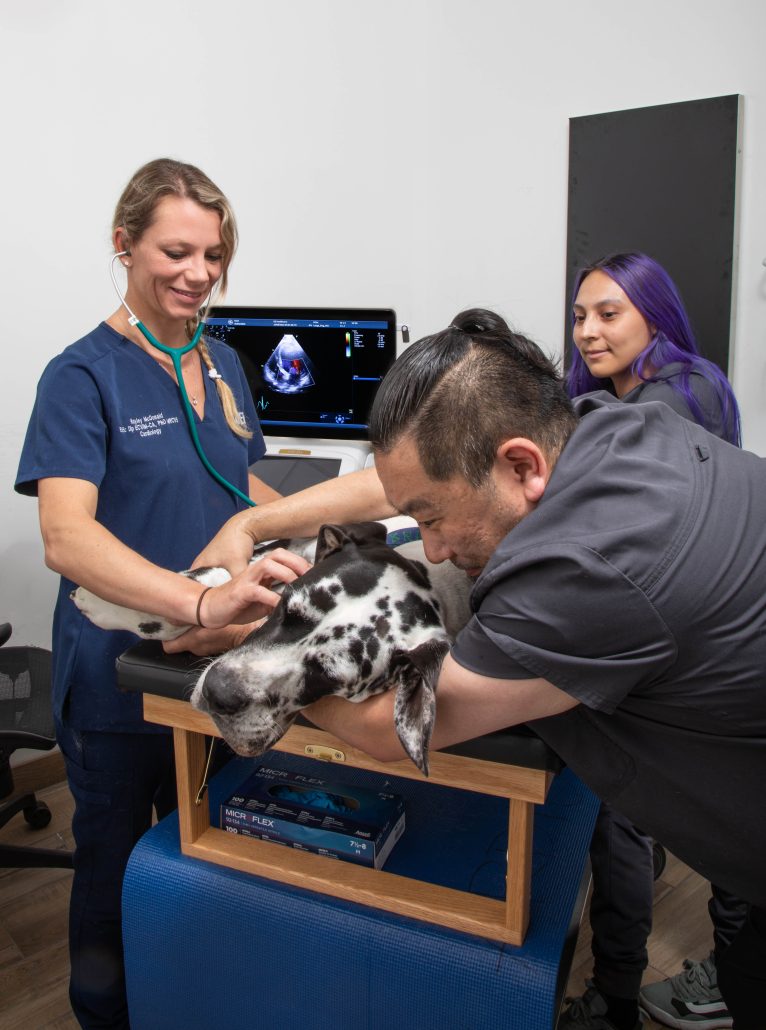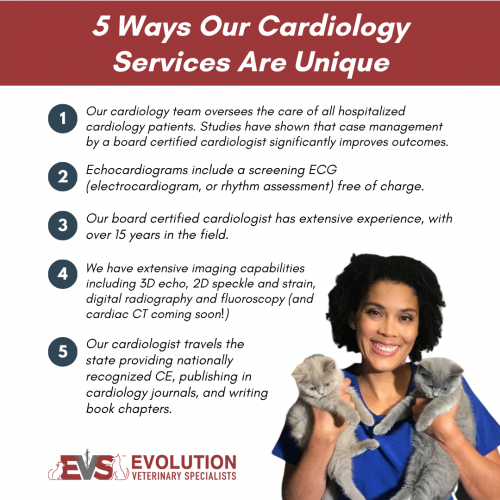Checking Out the Crucial Providers Supplied by a Vet Cardiologist: Recognizing Ultrasound and CT Check Methods
Veterinary cardiologists play a vital duty in the wellness of family pets by identifying and treating various heart disease. They make use of sophisticated imaging methods, such as cardiac ultrasound and CT scans, to give exact examinations. Each technique has its distinct benefits and applications. Comprehending these techniques is essential for pet proprietors seeking the best look after their buddies. What factors should pet dog proprietors consider when picking in between these diagnostic devices?

The Role of Veterinary Cardiologists in Family Pet Medical Care
Vet cardiologists play a vital role in the healthcare of animals, focusing especially on diagnosing and treating heart-related conditions. They possess specialized training that allows them to interpret complicated diagnostic tests and identify various cardio problems. These experts use sophisticated strategies, such as echocardiography and electrocardiography, to analyze heart function and structure accurately.Veterinary cardiologists also develop customized therapy strategies that might include medicines, way of life adjustments, and, in many cases, surgical interventions. Their know-how reaches informing animal owners regarding heart wellness, emphasizing the significance of regular exams and very early detection of potential problems. Cooperation with basic veterinarians is vital, as it assures detailed take care of family pets with thought cardiac concerns. By using specialized solutions, vet cardiologists greatly boost the high quality of life for animals and provide tranquility of mind for their owners, enhancing the value of heart health in total animal wellness.
Typical Cardiac Concerns in Pets
Typical heart concerns in animals can greatly affect their health and lifestyle. Heart murmurs, numerous kinds of cardiomyopathy, and genetic heart problems are amongst the most widespread conditions that vets encounter. Cancer Veterinary Near Me. Recognizing these issues is essential for family pet proprietors to ensure prompt medical diagnosis and appropriate therapy
Heart Murmurs in Pets
Although heart murmurs can be a source of problem for pet proprietors, they are not constantly indicative of severe wellness problems. A heart whispering is an abnormal sound created by stormy blood flow within the heart. In family pets, these murmurs can be triggered by different variables, including congenital heart problems, shutoff concerns, or even stress and anxiety throughout examinations. Numerous family pets with heart whisperings lead regular lives without substantial health influences. To identify the underlying cause, veterinary cardiologists commonly use analysis strategies such as echocardiograms and Doppler ultrasounds. Early discovery and analysis are important, as they might aid take care of any potential heart concerns effectively. Pet proprietors are urged to consult their vet for a thorough evaluation if a heart murmur is detected.
Cardiomyopathy Types Explained
Cardiomyopathy encompasses a team of illness impacting the heart muscle mass, resulting in compromised cardiac feature in pet dogs. One of the most typical kinds consist of expanded cardiomyopathy (DCM), hypertrophic cardiomyopathy (HCM), and restrictive cardiomyopathy (RCM) DCM mainly impacts canines, triggering the heart to enlarge and damage, which lessens its capacity to pump blood properly. In comparison, HCM is much more prevalent in felines, defined by the enlarging of the heart walls, typically resulting in blocked blood circulation. RCM, though much less common, takes place when the heart muscular tissue comes to be rigid, limiting its ability to load with blood. Each type provides one-of-a-kind difficulties in medical diagnosis and therapy, requiring specialized veterinary cardiological examination to assure peak management and take care of impacted pets.
Congenital Heart Flaws
Genetic heart defects stand for a considerable classification of cardiac problems in animals, distinct from acquired conditions such as cardiomyopathy - Board Certified Veterinary Cardiologist. These defects are architectural irregularities existing at birth, influencing the heart's normal function. Usual kinds consist of license ductus arteriosus, ventricular septal defects, and pulmonic constriction. Signs and symptoms might differ widely, varying from light to extreme, and can consist of workout intolerance, coughing, and problem breathing. Early diagnosis with sophisticated imaging techniques like ultrasound is crucial for effective monitoring. Vet cardiologists play a vital function in determining these problems and recommending suitable therapy alternatives, which might consist of medical administration or medical treatment. Identifying congenital heart problems permits better results and improved lifestyle for affected pets
Comprehending Heart Ultrasound: Exactly How It Functions
A substantial number of veterinary methods now use cardiac ultrasound as a necessary analysis device for reviewing heart health and wellness in pets. This non-invasive strategy uses high-frequency acoustic waves to create photos of the heart's structure and feature. During the treatment, a veterinary specialist uses a gel to the animal's chest and makes use of a transducer to discharge ultrasound waves. These waves jump off the heart and surrounding frameworks, creating real-time photos on a monitor.Veterinarians can assess different facets of heart health and wellness, consisting of chamber size, wall motion, and shutoff feature. Furthermore, heart ultrasound enables the discovery of problems such as liquid build-up and hereditary heart defects. This strategy is essential for identifying conditions that may not be visible via basic radiographs. By providing detailed details regarding the heart's anatomy and efficiency, cardiac ultrasound help in creating efficient treatment strategies for animals suffering from heart problem.
The Value of CT Scans in Detecting Heart Issues
How do CT scans boost the diagnosis of heart disease in vet medicine? CT scans give in-depth cross-sectional photos of the heart and surrounding frameworks, enabling vets to picture complex physiological relationships. This imaging strategy is particularly valuable in determining congenital heart flaws, cardiac growths, and abnormalities in blood vessels. By making use of sophisticated imaging algorithms, CT scans can examine heart chamber dimensions and function, supplying a complete view that may be hard to accomplish with typical methods.Additionally, CT angiography can imagine blood circulation and identify areas of constriction or blockage, which is vital for intending potential interventions. The rate and precision of CT scans also assist in quick medical diagnoses, vital in emergency scenarios. Eventually, the incorporation of CT checks into veterinary cardiology significantly boosts the precision of diagnoses, allowing targeted therapy strategies and boosting patient results for animals experiencing heart conditions.
Comparing Ultrasound and CT Check Strategies
While both ultrasound and CT scans are important tools in veterinary cardiology, they provide unique advantages and constraints that affect their usage in detecting heart disease. Ultrasound, or echocardiography, provides real-time imaging of the heart's structure and function, allowing veterinarians to examine heart chambers, valves, and blood flow. It is specifically reliable for reviewing problems like coronary infarction and cardiomyopathy. Ultrasound may be restricted in visualizing particular physiological frameworks due to client size or obesity.In comparison, CT checks deal in-depth cross-sectional pictures of the heart and bordering cells, making them suitable for determining structural abnormalities, lumps, or vascular problems. CT scans supply extensive insights, they call for sedation and might involve radiation direct exposure. Eventually, the choice in between ultrasound and CT scans depends on the details scientific situation, the patient's problem, and the info required for a precise diagnosis.
Therapy Options Readily Available Through Vet Cardiology
Veterinary cardiology offers a series of treatment choices customized to attend to various heart disease in pets. Treatment strategies commonly begin with way of life modifications, including diet regimen modifications and exercise modifications, targeted at improving overall heart wellness. Medications play a crucial function, with cardiologists recommending medicines such as diuretics, beta-blockers, and ACE preventions to resource enhance and manage signs cardiac function.In much more extreme instances, interventional procedures, such as balloon valvuloplasty or stent placement, might be needed to relieve clogs or improve blood flow. For sure hereditary heart issues, medical options may be explored to remedy architectural problems. Furthermore, recurring surveillance and follow-up care are essential elements of a thorough treatment strategy, enabling for prompt changes based upon the pet dog's feedback to treatment. Overall, veterinary cardiology concentrates on offering efficient, individualized like enhance the health and wellness and health of animal clients with heart problems.
Exactly how to Prepare Your Pet Dog for a Heart Evaluation
Preparing a pet for a cardiac evaluation is vital to ensure precise results and a smooth process. Proprietors need to initially arrange the visit with the veterinary cardiologist this contact form and talk about any specific requirements or concerns. It is recommended to keep food for a minimum of 12 hours prior to the evaluation, as this aids boost imaging high quality during procedures like ultrasound or CT scans.Additionally, keeping a calm setting on the day of the consultation can assist decrease the pet's anxiousness. It is valuable to bring along any kind of appropriate medical documents, including previous examinations and medications (Cancer Veterinary Near Me). Proprietors should also ensure that their pet is comfy and leashed during transportation to the clinic. Acquainting themselves with the examination process can assist and ease concerns in asking notified concerns during the examination. By following these actions, proprietors can contribute substantially to the performance of the cardiac analysis
Frequently Asked Inquiries
How Lengthy Does a Heart Ultrasound or CT Scan Take?
The period of a heart ultrasound usually varies from 30 to 60 mins, while a CT scan might take about 15 to half an hour. Aspects such as the patient's condition can affect these time price quotes.

Are There Any Risks Connected With These Diagnostic Procedures?

Can I Remain With My Pet Dog Throughout the Procedure?
The veterinary center's policy usually dictates whether pet proprietors can continue to be during procedures. While some facilities motivate owner visibility for convenience, others may call for splitting up to guarantee safety and ideal problems for diagnostic imaging.
Just how much Do These Analysis Tests Typically Price?
The expenses of diagnostic examinations, such as ultrasound and CT scans, generally differ based on area and facility. Typically, rates range from a few hundred to over a thousand bucks, showing the complexity and innovation involved.
What Is the Recuperation Process After a Heart Evaluation?
The recuperation process after a heart evaluation includes monitoring the family pet for any prompt reactions, making certain comfort, and restricting physical activity. Veterinarians typically supply post-evaluation guidelines to direct pet dog owners during this crucial healing duration. Heart whisperings, various kinds of cardiomyopathy, and genetic heart problems are amongst the most widespread conditions that veterinarians come across. A heart whispering is an unusual noise generated by turbulent blood flow within the heart. Cardiomyopathy includes a team of diseases affecting the heart muscle mass, leading to endangered cardiac function in family pets. Genetic heart issues represent a significant classification of cardiac issues in animals, unique from my latest blog post obtained conditions such as cardiomyopathy. Ultrasound, or echocardiography, supplies real-time imaging of the heart's framework and function, enabling veterinarians to evaluate heart chambers, valves, and blood circulation.